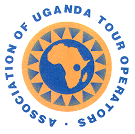Birding in and around Kampala (daytour)
One of Kampala’s best kept secrets is Kampala is a great destination for birding! Come and see this for yourself. Birders should be able to see up to 30 bird species in one day.
Highlights
- See the Eagles and Kites in Makerere University Gardens
- Search for numerous birds at the Bahai Temple and Ndere Centre
- Drive to the Kabakas Lake, manmade, with many water birds
- Enjoy the green parts of Kampala and the shores of Lake Victoria
- Try to see up to 30 bird species this day
Video
Route
Program
Birding Kampala
At 8.00 in the morning meet and greet with your driver guide.
Transfer from your hotel in Entebbe or Kampala to the leafy Makerere University gardens to see the numerous eagles and kites.
Continue birding at the Bahai Temple and Ndere centre.
To continue later to explore the Kabakas Lake, a manmade lake with many water birds including Kingfishers, Cormorants and Pelicans.
On our way we will also make stops in the more green parts of Kampala and on the shores of Lake Victoria.
Lunch in the afternoon and transfer back to your hotel in Kampala or Entebbe in the late afternoon.
Accommodations
prices 2024
Price on request, please send an email to mail@kazingatours.com
Includes
- Transfers to and from your hotel in Entebbe or Kampala
- Lunchbox
- Bottled drinking water
- Private 4x4 custom built safari vehicle with knowledgeable
- Driver/guide and fuel
- All activities and entrance fees for the mentioned activities
Excludes
- Flights
- Visa for Uganda
- Insurances
- Beverages and meals not mentioned
- Tips and personal expenses
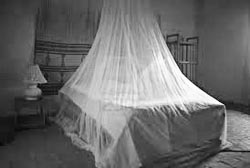 The Government of Uganda requires mandatory proof of Yellow Fever Vaccination for travelers 1 year of age and above. Travelers should possess a valid Yellow Fever vaccination certificate (vaccine received at least 10 days ago) prior to entry into Uganda. Travelers who do not meet this requirement must be vaccinated at the Airport (with possibility of isolation as determined by the Aiport health authority) prior to entry into Uganda at the travelers own costs.
The Government of Uganda requires mandatory proof of Yellow Fever Vaccination for travelers 1 year of age and above. Travelers should possess a valid Yellow Fever vaccination certificate (vaccine received at least 10 days ago) prior to entry into Uganda. Travelers who do not meet this requirement must be vaccinated at the Airport (with possibility of isolation as determined by the Aiport health authority) prior to entry into Uganda at the travelers own costs.
Furthermore all required inoculations must be recorded by your health practitioner on a valid vaccination certificate. You must carry this document with you throughout the tour. All visitors should take malaria prophylactic drugs. We also advise that you bring a mosquito repellent with you. Always consult your doctor or pharmacist for up to date requirements, inoculations and personal recommendations!
Normally you need the following vaccinations (but please always consult a doctor):
- Yellow Fever
- DTP
- Hepatitis
For Malaria you need to take tablets, Malarone or Lariam. Malarone is mostly used (please always consult a doctor).
Hygiene is not at the same standard as in your home country, so we advise you to bring a disinfectant cream with you. Always drink bottled water instead of tap water.
On arrival on the airport our guide will be there waiting for you. During safari we use custom made safari vehicles, custom made for an optimal view of the wildlife. Safari vehicles (and small aircrafts) provide limited space for luggage. It is therefore recommended to travel with light bags since bulky suitcases will overload and might be difficult to be taken on board.
Uganda visa information
The Government of Uganda has an online visa application When you are visiting Uganda you must apply for a visa online:
- Go to the website https://visas.immigration.go.ug/
- Please make sure you have the following documents in .pdf, .jpeg, .png or .bmp format: a copy of your passport, copy of recent passport size photograph and a vaccination certificate (Yellow Fever)
- Fill in the form:
- Visit Uganda only: single entry: “ordinary” visa, USD 50
- Visit 2 countries or more: East Africa / multi entry visa, USD 100 (participating in the East African visa: Uganda, Rwanda and Kenya)
- When you send the form you will immediately receive a tracking code. This code helps you to keep track of how far your application has progressed. You can check its status from this webpage
- The Ugandan authorities will send you a letter in the email after they have approved your application (please check you SPAM folder too)
- Print this letter and bring it with you when you arrive at the overland border or at Entebbe International Airport. You need this letter to be allowed to purchase the entree visa there for USD 50 (Uganda) or USD 100 (East Africa-Multi Entry).
Some nationalities do not require a visa, please check this in advance.
In most of the cities it is possible to withdraw money from an ATM. Travelers Cheques are not widely accepted and it is very difficult or impossible to pay by credit card outside the cities. The US dollar is traditionally the hard currency of preference. We advise to bring some Dollars for daily expenses and tips.
Dollar bills should not be older than 10 years.
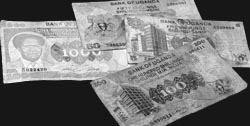 The unit of currency is the Ugandan Shilling. Please check the latest exchange rates before you go to your destination. This will be a guideline. Please note you will get a better exchange rate in the bigger cities.
The unit of currency is the Ugandan Shilling. Please check the latest exchange rates before you go to your destination. This will be a guideline. Please note you will get a better exchange rate in the bigger cities.
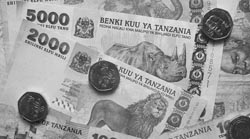
The unit of currency is the Tanzanian Shilling. Please check the latest exchange rates before you go to your destination. This will be a guideline. Please note you will get a better exchange rate in the bigger cities.
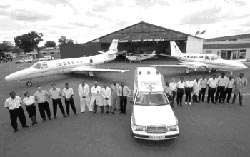
We advise you to apply for a Flying Doctors membership. The membership provides a quick and reliable air evacuation and medical care if needed.
AMREF Flying Doctors offers 2 covers (Annual and Short Term). You can choose between the Maisha Silver (Kenya, Tanzania and Zanzibar), Maisha Gold (Kenya, Tanzania, Zanzibar, Uganda, Rwanda and Burundi) or Maisha Platinum (Kenya, Tanzania, Zanzibar, Uganda, Rwanda, Burundi, South Sudan and Ethiopia).
Please check out the AMREF Flying Doctors website for more information and to become a member.
 Educated Ugandans are generally fluent in English, which is the official language in Uganda. Next to English there are about 30- plus different indigenous languages.
Educated Ugandans are generally fluent in English, which is the official language in Uganda. Next to English there are about 30- plus different indigenous languages.
Uganda is a tropical country, with higher temperatures at lower altitudes (Kampala, Murchison Falls, Kidepo and Bundibugyo).
Areas around Bwindi, Mgahinga, and Lake Bunyonyi are generally cooler.
Uganda can be visited at any time throughout the year. But please keep in mind that mountain hikes, gorilla tracking and other forest walks are more challenging during the rainy seasons (March - May and October - November).
For birders the rainy season is considered to be the best time to visit Uganda.
Rainy season means it rains more often, but not every day and not the whole day.
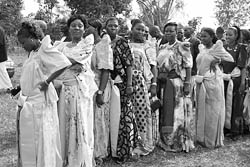
Daytime temperatures are generally warm to hot, so bring lots of light clothing. Evenings are cooler, especially at high altitudes (areas around Bwindi, Mgahinga, Lake Bunyonyi and Kabale) so carry a couple of sweaters too.
Those who intend to do mountain hiking will be exposed to alpine temperatures and should pack accordingly. Do not forget to bring a hat, sunglasses, sunscreen and a waterproof jacket.
During safaris we advise to avoid black and dark blue clothes (because they can attract tsetse flies).
If you are planning on doing a community walk or visit the local people, we advise you to wear appropriate clothing. For example women putting on long skirts and a top that covers the shoulders
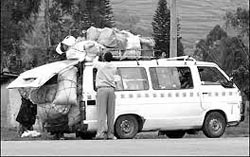 A valid passport is mandatory (passport must be valid for at least 3 months after re-entry) and visa requirements for all countries you are planning to visit should be checked before you travel.
A valid passport is mandatory (passport must be valid for at least 3 months after re-entry) and visa requirements for all countries you are planning to visit should be checked before you travel.
To make the most of your visit to the game reserves and national parks, we advise you to carry binoculars and field guides.
Photographers will need a zoom lens for wildlife (70-300 or more). Please make sure to carry enough memory cards with you. Toiletries and other essentials can be bought in the cities.
A torch (flashlight) can proof to be very useful
We advise you to take an international adapter with you for your electric equipment. The system used in Uganda is the British system. In most lodges it is possible to charge your batteries.
 Driving in Uganda is on the left-hand side.
Driving in Uganda is on the left-hand side.
Visitors without experience of African roads are advised to travel with a 4x4 vehicle driven by a knowledgeable driver/guide, rather than self-drive.
All our guides are well trained in "Defensive Driving".
Please mind that washrooms along the road are sometimes not to European standards, for example squatting toilets, no flushing toilets or no toilet paper available. Like the locals say: T.I.A. This Is Africa.
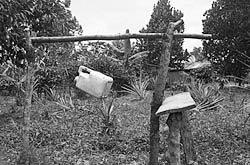 Bathroom facilities and accommodations can be more basic when traveling on a medium to low budget. In the eco lodges mind that the water reserves are limited and in most cases there are no sockets in the room, but you can always charge your devices at the reception.
Bathroom facilities and accommodations can be more basic when traveling on a medium to low budget. In the eco lodges mind that the water reserves are limited and in most cases there are no sockets in the room, but you can always charge your devices at the reception.
 Tipping will always be appreciated. It is normal to tip 5-10% in hotels and restaurants. Guides, drivers and carriers should always be tipped. Indication: for carriers USD 1-3 and for your driver/guide USD 5-15 per day, depending on the group size, number of days and your satisfaction.
Tipping will always be appreciated. It is normal to tip 5-10% in hotels and restaurants. Guides, drivers and carriers should always be tipped. Indication: for carriers USD 1-3 and for your driver/guide USD 5-15 per day, depending on the group size, number of days and your satisfaction.
The Bradt Travel Guide is the most detailed guidebook for Uganda. The Lonely Planet (East Africa), Footprint Guides and Spectrum Guides produce other guidebooks. For wildlife, the best guidebook is ‘Watching Wildlife East Africa’ from the Lonely Planet. For birding, the best guidebook is ‘birds of East Africa’. It is advisable to get the most updated copy.

